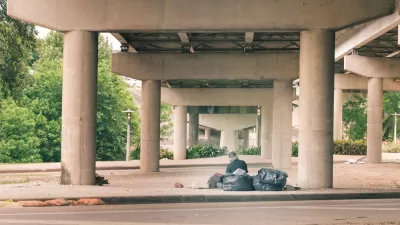While the numbers of unhoused people in other major U.S. cities grow, Houston has managed to effectively end veteran homelessness and house more than 26,000 people since implementing a ‘Housing First’ approach a decade ago.

What is driving Houston’s unparalleled success among big U.S. cities at reducing the number of people experiencing homelessness? As Danielle McLean explains for Smart Cities Dive, “The greater Houston area saw a 53% decrease in its homeless population between 2011 and 2020. During that time, the homeless population in the city and county of Los Angeles grew by 84%, New York City by 52%, and Dallas by 26%.”
McLean adds that “Since 2012, the Houston model has housed over 26,000 people, with 90% of them remaining housed for two or more years, according to Eichenbaum.” By 2015, the city ‘effectively ended’ homelessness among military veterans.
According to McLean, “Houston worked with surrounding county governments, various community stakeholders and nonprofit service providers to develop a model that, despite operating with a small budget, has decreased the area’s homeless population by roughly 63% since 2011, according to a recent city report.”
Houston’s success is attributed to three main factors:
- Housing First: “The city employs a housing-first model that prioritizes providing permanent housing to people experiencing homelessness as quickly as possible with no barriers to entry. The city then provides wraparound support services to ensure they remain housed.”
- A regional continuum of care that puts all organizations and agencies providing services to unhoused people under one umbrella.
- Data-driven decisionmaking that relies on proven data to allocate resources and decide on what projects and initiatives to support.
“But, according to Ann Oliva, CEO of the National Alliance to End Homelessness, success in other cities will depend on communitywide buy-in.” In Houston, widespread support from local officials and stakeholders have been an important aspect of the city’s success.
FULL STORY: How Houston’s homeless strategy became a model for other U.S. cities

Maui's Vacation Rental Debate Turns Ugly
Verbal attacks, misinformation campaigns and fistfights plague a high-stakes debate to convert thousands of vacation rentals into long-term housing.

Planetizen Federal Action Tracker
A weekly monitor of how Trump’s orders and actions are impacting planners and planning in America.

In Urban Planning, AI Prompting Could be the New Design Thinking
Creativity has long been key to great urban design. What if we see AI as our new creative partner?

King County Supportive Housing Program Offers Hope for Unhoused Residents
The county is taking a ‘Housing First’ approach that prioritizes getting people into housing, then offering wraparound supportive services.

Researchers Use AI to Get Clearer Picture of US Housing
Analysts are using artificial intelligence to supercharge their research by allowing them to comb through data faster. Though these AI tools can be error prone, they save time and housing researchers are optimistic about the future.

Making Shared Micromobility More Inclusive
Cities and shared mobility system operators can do more to include people with disabilities in planning and operations, per a new report.
Urban Design for Planners 1: Software Tools
This six-course series explores essential urban design concepts using open source software and equips planners with the tools they need to participate fully in the urban design process.
Planning for Universal Design
Learn the tools for implementing Universal Design in planning regulations.
planning NEXT
Appalachian Highlands Housing Partners
Mpact (founded as Rail~Volution)
City of Camden Redevelopment Agency
City of Astoria
City of Portland
City of Laramie





























